What are the differences between selling to large and small retail chains?
Selling your consumer product to chains presents a business opportunity, with potential for substantial profits. However it’s crucial to understand the distinctions between selling to chains and smaller retailers. In this short video training, we will discuss the contrasts between these two types of retailers. Assist you in determining which one aligns best with your business goals.
When it comes to selling to known giants like Walmart or Target there are a few key aspects to consider. These chains boast a network of stores. Have high demands for product quantities. Consequently it is essential for you to have a established manufacturing process in place that can meet their requirements efficiently.
Large retail chains also place emphasis on shipping and delivery times. They maintain standards. Expect you to be meticulous in every aspect of the process. While smaller retailers also value these factors the stakes are higher when dealing with chains due to the volumes involved.
Selling your products through chains may entail more challenges and stressful experiences; however it can also bring greater financial rewards. If you aspire for success and longevity in your business venture choosing to sell through chains might be the right path, for you.
Keep in mind that there is potential, for business deals millions of dollars when dealing with larger retail chains.
Selling to chains has its advantages as well. It allows you to gain experience and practice before venturing into the market. Smaller retailers tend to be more forgiving when it comes to promotions, costs and fees. They provide an opportunity for you to tune your processes. Learn from any mistakes without facing the same level of consequences that come with dealing with larger chains.
Moreover smaller retail chains offer a less corporate experience. While there is still effort involved in selling to these retailers it is generally less demanding compared to dealing with their counterparts. If you prefer a intimate approach to doing business starting with smaller retailers might be a better fit for you.
Ultimately the decision between selling to chains or small retailers depends on your personal preferences and goals. There is no right or wrong answer here. If you find that selling to chains causes you stress and unhappiness don’t hesitate to shift your focus towards retailers instead. The consumer product industry offers plenty of opportunities, for success so it’s crucial to find a path that aligns with your values and brings you joy.
In addition, to selling products to chains there are avenues worth considering like selling online or targeting individual stores. Selling presents a set of opportunities and challenges while focusing on individual stores can help reduce the stress associated with dealing with larger chains.
Remember, if one approach doesn’t yield the desired results it doesn’t mean you should give up. There are always paths to explore. Find what works for you. Brings you satisfaction and don’t hesitate to adapt and experiment with strategies.
To sum up both selling to chains and smaller retailers have their own advantages and factors to consider. It’s crucial to assess your goals and preferences in order to determine the path for you. Whether you decide to pursue rewards by partnering with big retail chains or opt for a more personalized experience working with smaller retailers there are opportunities for success in the consumer product industry.
Always remember that success lies in finding what suits you best and being open minded about adjusting your strategies. Don’t get discouraged if one approach doesn’t achieve the desired outcome. Keep exploring possibilities and experimenting until you find the fit, for your business.
Ultimately the decision, between selling to chains and smaller retailers comes down to personal preferences. It’s important to consider your goals how well you handle stress and the level of success you desire. With the mindset and approach you can thrive in the industry and establish a prosperous business.
Thank you for taking the time to watch our training. I sincerely hope that it has provided you with insights into the distinctions between selling to retail chains versus small retailers. If you have any inquiries or require assistance with your venture please don’t hesitate to reach out. Wishing you all the best on your path towards success, in the world of retail!
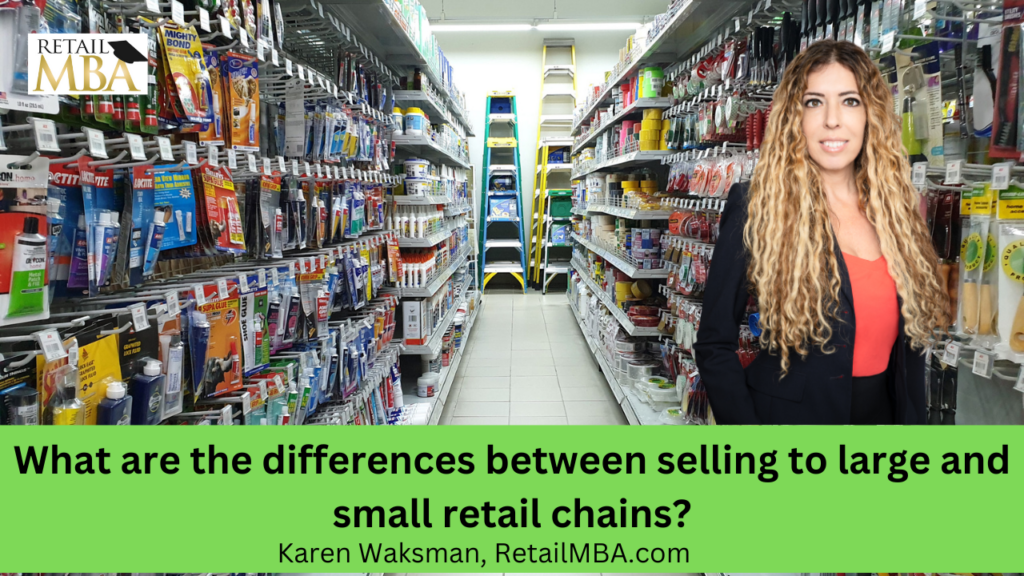
Transcript for Navigating the Retail World; Deciding Between Big Chains and Small Retailers
Discover valuable insights into the changing landscape, with Karen Waksman, the visionary founder of Retail MBA. Her latest training session sheds light on the differences between selling to retail chains and smaller retailers. If you’re an entrepreneur with a consumer product Waksmans guidance serves as a roadmap to help you navigate the complexities of choosing between industry giants and smaller players.
Understanding the Retail Landscape; Size Matters
For entrepreneurs aiming for success in the arena its essential to comprehend the distinctions between retail chains and smaller retailers. Waksman highlights how size plays a role as evidenced by powerhouses like Walmart with their multitude of stores worldwide contrasting with smaller retailers that range from local boutiques to regional chains.
Large Retail Chains – The High Stakes Game
When considering selling to chains entrepreneurs need to be prepared for a different playing field. The sheer number of stores requires manufacturing capabilities, efficient logistics and the ability to handle quantities swiftly. Waksman emphasizes the importance of shipping and prompt deliverability. While there is potential, for revenue dealing with chains involves navigating additional complexities and shouldering a greater level of stress.
Smaller Retailers – Embracing OpportunitiesThe Ground, for Getting Started
On the hand smaller retail stores offer a lenient environment for entrepreneurs to gain experience in the retail industry. These stores can range from businesses and specialty shops to chains. The advantage lies in having space for trial and error allowing entrepreneurs to refine their strategies and product offerings without the pressure of dealing with large retail chains.
Considering Your Options; Factors to Think About
When deciding whether to target chains or opt for smaller retailers entrepreneurs should take into account several important factors. Waksman highlights considerations that can help entrepreneurs make decisions that align with their business goals and personal preferences.
Experience vs. Ambition
One crucial factor is determining whether an entrepreneur needs practical experience or is ready to aim high. Starting with retailers provides an opportunity, for training where entrepreneurs can develop their skills test their products and grasp the complexities of the retail process. On the hand aiming for retail chains from the beginning requires a higher level of readiness and ambition.
Corporate vs. Semi Corporate
Waksman introduces the idea of experiencing dynamics when working with retail chains emphasizing that it involves entering a more corporate environment.
This particular setting imposes requirements, more regulations and higher stakes. On the hand smaller retail chains offer an less corporate atmosphere.
Forgiveness, vs. Corporate Inflexibility
chains are often portrayed as more forgiving when it comes to handling nuances in promotions, costs and fees. The rigid corporate structure of chains means that any mistake, whether in shipping or compliance can lead to penalties. Entrepreneurs looking for a flexible environment may find smaller retail chains to be a better starting point.
Understanding the Factors that Cause Stress
Waksman sheds light on the stress factors associated with dealing with chains. She highlights that many stories of entrepreneurs losing money stem from not following orders and instructions. To address these stress factors she introduces the concept of workarounds while emphasizing the importance of following procedures.
Core Systems for Stress Free Navigation, in Retail MBA
Waksmans Retail MBA core systems aim to make selling to chains a stress free process. By providing entrepreneurs with insights and tools to navigate the complexities of working with retailers the program strives to ensure an more enjoyable experience.
Ultimately when it comes to choosing between chains and smaller retailers an entrepreneurs personality, goals and ability to handle stress play a significant role. Than viewing it as a decision Karen Waksman encourages entrepreneurs to consider what feels right for them as individuals.
Karen Waksman reassures entrepreneurs that there are paths, to success in the consumer product industry. Whether its selling online or targeting stores each path has its set of challenges and rewards. The key is aligning the chosen path with preferences and business objectives.
For guidance on how to approach, pitch and sell products to retailers Karen Waksman recommends Retail MBA. This platform provides a variety of resources tailored to entrepreneurs in every product category, including DIY programs and done for you programs. Through webinars and training sessions that cover aspects of revenue generation in the retail landscape Retail MBA equips entrepreneurs with the tools they need to thrive.
In conclusion, Karen Waksmans insights provide an understanding of the journey that entrepreneurs undertake in the retail industry. Their ambitions, personality traits and business goals shape their path, towards success.
Entrepreneurs can achieve success by comprehending the distinctions, between chains and smaller retailers. The realm of presents prospects and, with a well informed strategy entrepreneurs can discover their unique market segment generate profits and relish in the thrilling adventure of establishing a brand of consumer products.,
Here are a few other blog posts you might be interested in:

Step-by-step training on how to sell to retail chains!
We explain exactly how to do that and how to get started today. I’ve taught over 100,000 of companies over the years across the globe on how to get your products to the stores. And so we’re here to support you. Or please subscribe to our Youtube channel and or be on the lookout for additional training that we create.
We are here to expedite the process of generating revenue with your physical products and that’s what we’re all about. Take a look at our advanced training, live events, certification programs and so much more.
In this training, I will discuss some of the things to think about when approaching a retailer to sell your products and become a vendor. Hope it helps! 🙂
Karen Waksman,
Retail MBA
Questions? Contact Us!
1-855-Retail-2 (Call or Text)
Email: info@retailmba.com
Retail MBA provides a step-by-step formula on How to Sell to Major Retailers, Online Retailers, Smaller Retailers, Catalogs and More. No Experience Required! These solutions continue to convert for clients year-over-year! These are Time-Tested and Proven Strategies that we utilize ourselves when going after stores! Everything we teach, we test. Want access to these formulas? ANY one of our programs and coaching systems gives you access to them now. With that said…
Here are 5 Easy Ways to Work with Us:
1) Free Training – If You Would Like to Join Our Next FREE Webinar Training Called “Retail Chain Store Secrets – How to Sell to Major Retail Chains. No Experience Required” Then Sign Up NOW To Learn All About Selling into Retail Chains By Clicking Here!
2) Retail MBA Year Long Coaching and Training System – Our Year Long Coaching and Training System with Karen Waksman is POWERFUL! This is our most popular training and coaching system! We walk you through how to approach, pitch and sell to retail chains and we coach you along the way! Join us by Clicking Here!
3) Masterclass Intensives – Want to Join our Next 4 Week Elite Retail MBA Masterclass Intensive? These Intensives Are EPIC for people who Love Fast Paced Learning – Homework, Retail Coaching, Developing Your Strategy, Buyers Contacts and More! These Events Are Held Every Quarter. Join us by Clicking Here!
4) Done-for-You Program – If You Want Karen Waksman and Her Team to Reach Out to Your Top Dream Retail Chains On Your Behalf – And You Have a Retail-Ready Product, Check Out our Epic Done-For-You Service by Clicking Here!
5) In Person Events – If You Want to Learn LIVE and Meet Karen Waksman in Person at Our Next “America’s Next Retail Product: LIVE Event with Other Like-Minded Individuals in Beautiful San Diego, CA! We Would LOVE to Have You Join Us by Clicking Here!
Check Out Our Additional Blog Posts Here:

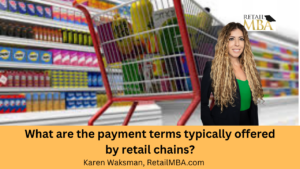
Retail Terms
Retail Terms – What are the payment terms typically offered by retail chains? Click Here to Learn More!
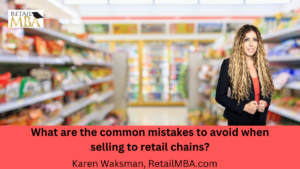
Retail Vendor
Retail Vendor – What are the common mistakes to avoid when selling to retail chains? Click Here to Learn More!
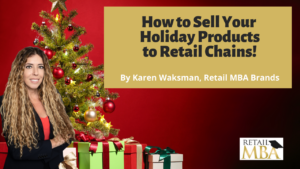
How to Sell Your Holiday Products to Retail Chains
New Training on How to Sell Your Holiday Products to Retail Chains
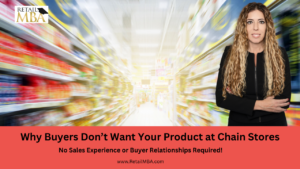
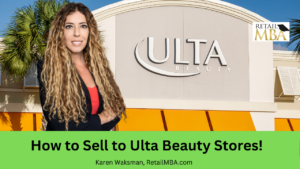
Ulta Beauty Vendor
Ulta Beauty Vendor – How to Sell to Ulta Beauty Stores. Click Here to Learn More!
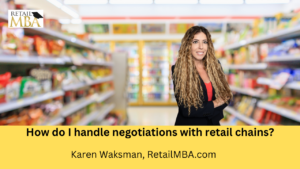
Retail Strategy
Retail Strategy – How do I handle negotiations with retail chains? Click Here to Learn More!

